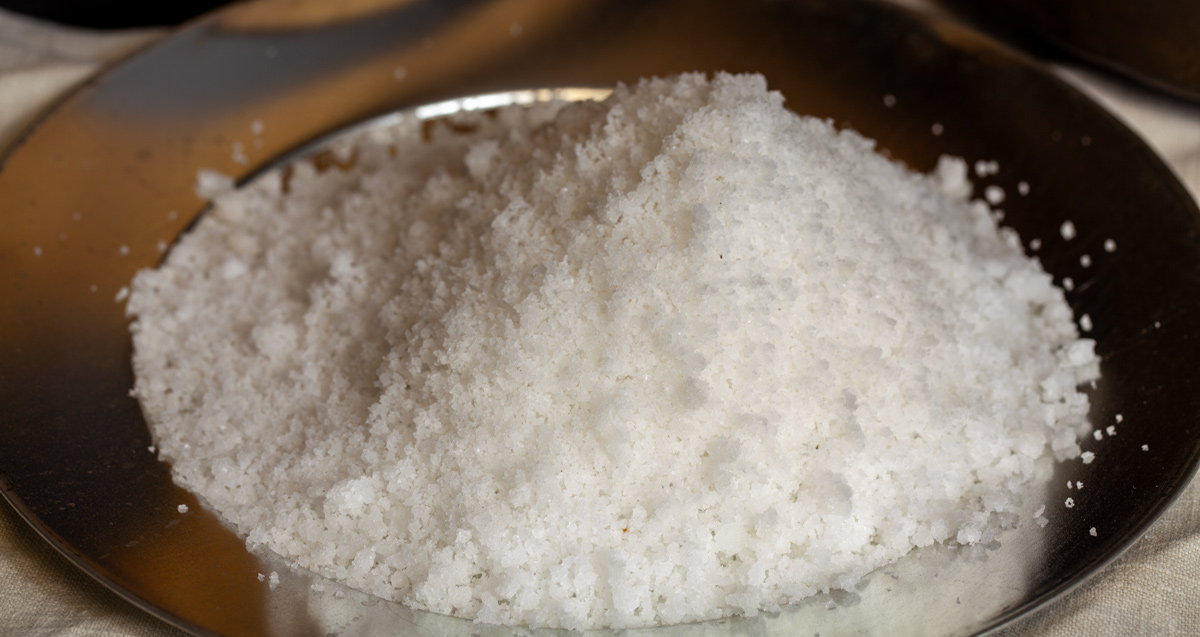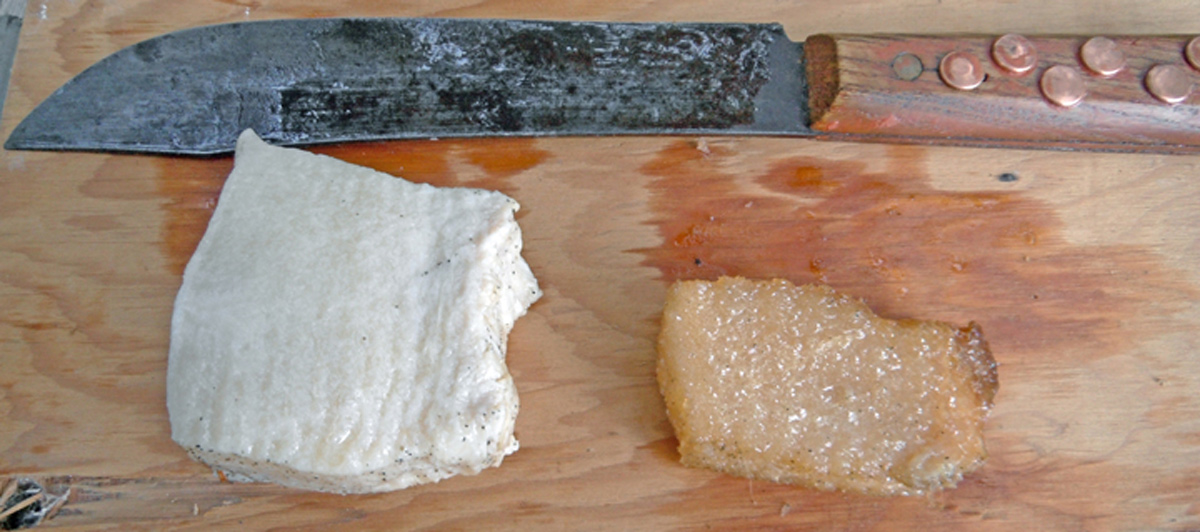Fort Clatsop, Astoria, OR Willard, Weiser, and Sgt. Gass return with whale blubber and fine salt from the salt works. The captains decide that Clark will travel to see the beached whale.
A Taste of Blubber[1]Originally aired weekdays by Yellowstone Public Radio during the Bicentennial observance of 2003-2006. Narrated by Hal Hansen. Scripts by Whit Hansen and Ed Jacobson. Produced by Leni Holliman. © … Continue reading
Fine Salt
Sea Salt
© 2012 by Kristopher K. Townsend. Permission to use granted under the Creative Commons Attribution-Share Alike 4.0 International license.
Above:This salt was made by the photographer on 18 December 2010. The seawater was collected and boiled at the location of the salt maker’s camp at Seaside, Oregon using a clean pot and modern, indoor stove. The photographer has also made salt at that location by boiling seawater in kettles over an open fire. With the later method, ashes often settle in the brine resulting in grayer salt. Lewis’s remark about the whiteness of the salt was a compliment to the care taken by the expedition’s salt makers.
[Willard and Weiser] brought with them a specemine of the salt of about a gallon, we found it excellent, fine, strong, & white; this was a great treat to myself and most of the party, having not had any since the 20th ultmo.; I say most of the party, for my friend Capt. Clark declares it to be a mear matter of indifference with him whether he uses it or not; for myself I must confess I felt a considerable inconvenience from the want of it
—Meriwether Lewis
Salt Maker’s Camp
J. Fields, Bratton and Gibson (the Salt makers) had . . . erected a comfortable camp killed an Elk and several deer and secured a good stock of meat; they commenced the making of salt and found that they could obtain from 3 quarts to a gallon a day;
—Meriwether Lewis
A Taste of Blubber
According to the photographer, the blubber thickness on this specimen indicates a starving whale. The piece on the right has been boiled.[2]John W. Fisher, “Baleen, Blubber & Train Oil from Sacagawea‘s ‘monstrous fish,” We Proceeded On, vol. 43 No. 2. Read at … Continue reading
[This whale blubber] was white & not unlike the fat of Poark, tho’ the texture was more spongey and somewhat coarser. I had a part of it cooked and found it very pallitable and tender, it resembled the beaver or the dog in flavour. it may appear somewhat extraordinary tho’ it is a fact that the flesh of the beaver and dog possess a very great affinity in point of flavour.
—Meriwether Lewis
In Search of a Whale
I determine to Set out early tomorrow with two canoes & 12 men in quest of the whale or at all events to purchase from the indians a parcel of the blubber
—William Clark
Gass’s Rafting Mishap
made a raft to cross the creek; but when it was tried we found it would carry only one person at a time; the man with me was therefore sent over first, who thought he could shove the raft across again; but when he attempted, it only went half-way: so that there was one of us on each side and the raft in the middle. I, however notwithstanding the cold, stript and swam to the raft, brought it over and then crossed on it in safety;
—Patrick Gass
Weather Diary
aspect of the weather at rise
Wind at rise
Weather at 4 OC. P.M. Wind at 4 OC. P.M. rain S E rain S. E —Meriwether Lewis[3]To assist the reader, the editor of this web page has omitted the “Day of the month” column and spelled out some abbreviations.
Fort Clatsop is a High Potential Historic Site along the Lewis and Clark National Historic Trail managed by the U.S. National Park Service. The site is managed by the Lewis and Clark National and State Historic Parks.
Notes
| ↑1 | Originally aired weekdays by Yellowstone Public Radio during the Bicentennial observance of 2003-2006. Narrated by Hal Hansen. Scripts by Whit Hansen and Ed Jacobson. Produced by Leni Holliman. © 2003 by Yellowstone Public Radio. |
|---|---|
| ↑2 | John W. Fisher, “Baleen, Blubber & Train Oil from Sacagawea‘s ‘monstrous fish,” We Proceeded On, vol. 43 No. 2. Read at https://lewisandclark.org/wpo/pdf/vol43no2.pdf#page=26. |
| ↑3 | To assist the reader, the editor of this web page has omitted the “Day of the month” column and spelled out some abbreviations. |




